30 Jan 2018 | News, Volume 46.04 Winter 2017, Volume 46.04 Winter 2017 Extras
[vc_row][vc_column][vc_column_text]
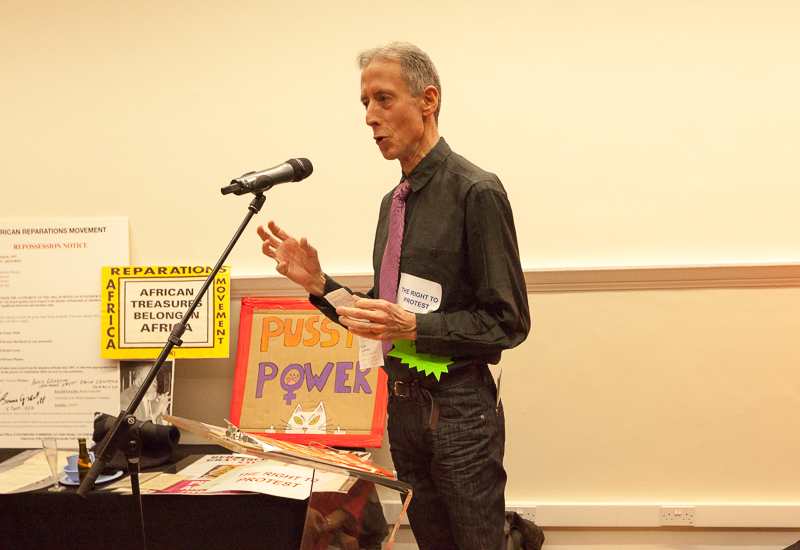
Peter Tatchell discusses the importance of the right to protest. (Photo: Sean Gallagher / Index on Censorship)
Index on Censorship magazine celebrated the launch of its winter 2017 magazine at the Bishopsgate Institute in London with an evening exploring the legacies of iconic protests from 1918 and 1968 to the modern day and reflecting on how today, more than ever, our right to protest is under threat.
Speakers for the evening included human rights campaigner Peter Tatchell, Bishopsgate Institute special collections and archives manager Stefan Dickers and artist Patrick Bullock.
Tatchell discussed the importance of protest for any democracy and the significant anniversaries of protests in 2018 throughout his speech. “This year is a very special year, a very historic year, I think that those protests remind us that protest is vital to democracy,” he said. “It is a litmus test of democracy, it is a litmus of a healthy democracy. Democracies that don’t have protest, there is a problem, in fact, you might even say they aren’t true democracies.”
“With 1968 came the birth of the women’s liberation movement, the mass protests in Czechoslovakia against Russian occupation, and, of course, the huge protests against the American war in Vietnam,” Tatchell added. “Those protests all remind us that protest is vital to democracy.”
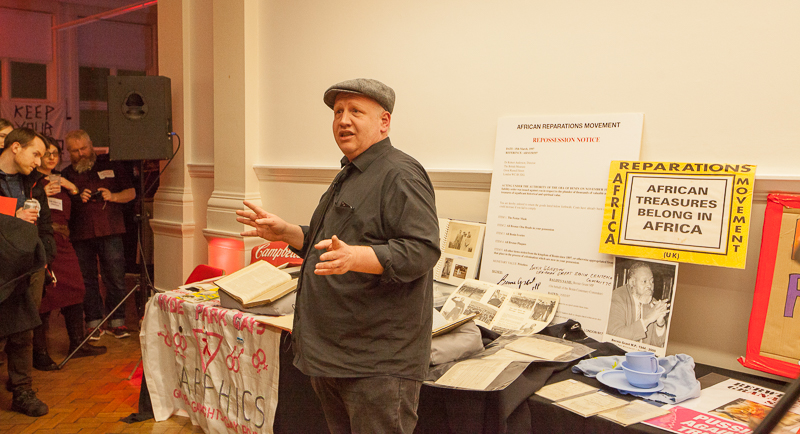
Bishopsgate Institute special collections and archives manager Stefan Dickers at the launch of What price protest? (Photo: Sean Gallagher / Index on Censorship)
This year also marks the centenary of the right to vote for women in Britain. Dickers showcased artefacts the Bishopsgate Institute’s collection of protest memorabilia, including sashes worn by the Suffragettes and tea sets women were given upon leaving prison for activities related to their activism.
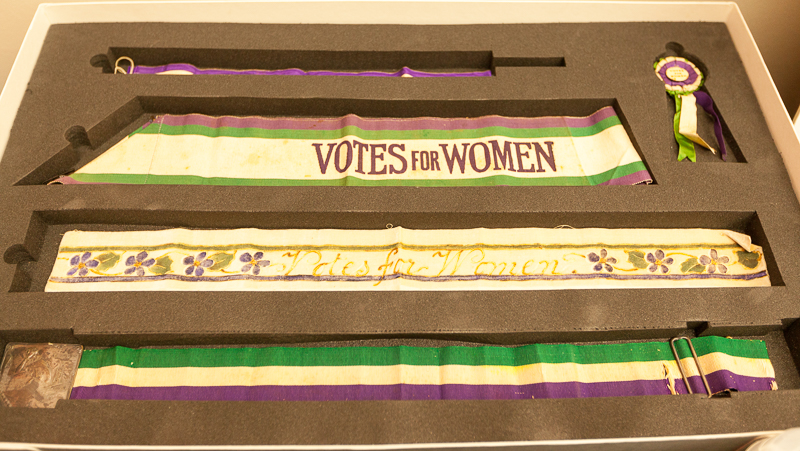
Suffragette sashes at the launch of What price protest? (Photo: Sean Gallagher / Index on Censorship)
Attendees included actor Simon Callow, who stressed the importance of protest and freedom of expression: in an interview at the event with Index on Censorship. “There are all sorts of things that people find inconvenient and uncomfortable to themselves, that they don’t wish to hear, but that’s not the point,” he said. “The point is that if some people feel very strongly that certain things are wrong, then they must be allowed to say something.”
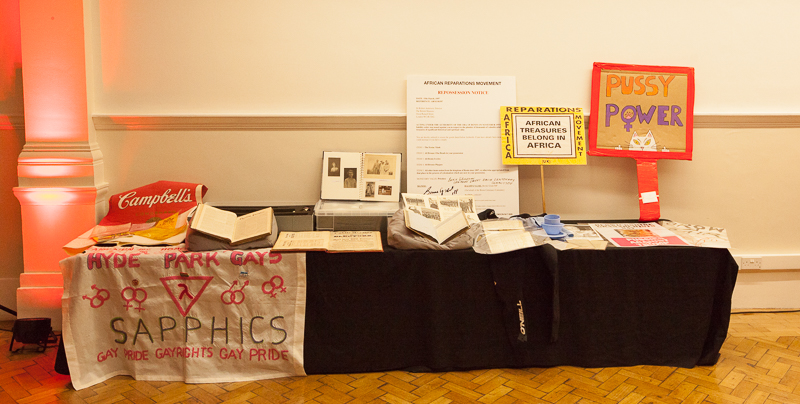
Disobedient objects at the launch of What price protest? (Photo: Sean Gallagher / Index on Censorship)
Eastenders actress Ann Mitchell, who also attended the event, said: “There is no question in my opinion, that the darkness in the world at the moment must be protested against. All the advantages we have won as women, as ethnic minorities, are being destroyed, they are being wiped out. Unless we hear voices of protests for that, that will continue.”
The night concluded with a performance by protest choir Raised Voices.
Index magazine’s winter issue on the right to protest features articles from Argentina, England, Turkey, the USA and Belarus. Activist Micah White proposes a novel way for protest to remain relevant. Author and journalist Robert McCrum revisits the Prague Spring to ask whether it is still remembered. Award-winning author Ariel Dorfman’s new short story — Shakespeare, Cervantes and spies — has it all. Anuradha Roy writes that tired of being harassed and treated as second-class citizens, Indian women are taking to the streets.b
[/vc_column_text][/vc_column][/vc_row][vc_row][vc_column width=”1/3″][vc_custom_heading text=”What price protest?”][vc_column_text]Through features, interviews and illustrations, the winter issue of Index on Censorship magazine looks at the state of protest today, 50 years after 1968, and exposes how it is currently under threat.
With: Ariel Dorfman, Anuradha Roy, Micah White, Richard Ratcliffe[/vc_column_text][/vc_column][vc_column width=”1/3″][vc_single_image image=”96747″ img_size=”medium”][/vc_column][vc_column width=”1/3″][vc_custom_heading text=”Subscribe”][vc_column_text]In print, online. In your mailbox, on your iPad.
Subscription options from £18 or just £1.49 in the App Store for a digital issue.
Every subscriber helps support Index on Censorship’s projects around the world.
 SUBSCRIBE NOW[/vc_column_text][/vc_column][/vc_row]
SUBSCRIBE NOW[/vc_column_text][/vc_column][/vc_row]
4 Dec 2017 | About Index, History, Magazine, News
[vc_row][vc_column][vc_custom_heading text=”The first editor of Index on Censorship magazine reflects on the driving forces behind its founding in 1972″ google_fonts=”font_family:Libre%20Baskerville%3Aregular%2Citalic%2C700|font_style:400%20italic%3A400%3Aitalic”][vc_column_text][/vc_column_text][vc_row_inner][vc_column_inner][vc_column_text]A version of this article first appeared in Index on Censorship magazine in December 1981. [/vc_column_text][/vc_column_inner][/vc_row_inner][/vc_column][/vc_row][vc_row][vc_column][vc_column_text]
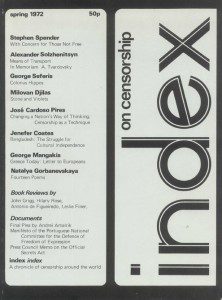
The first issue of Index on Censorship Magazine, 1972
Starting a magazine is as haphazard and uncertain a business as starting a book-who knows what combination of external events and subjective ideas has triggered the mind to move in a particular direction? And who knows, when starting, whether the thing will work or not and what relation the finished object will bear to one’s initial concept? That, at least, was my experience with Index, which seemed almost to invent itself at the time and was certainly not ‘planned’ in any rational way. Yet looking back, it is easy enough to trace the various influences that brought it into existence.
It all began in January 1968 when Pavel Litvinov, grandson of the former Soviet Foreign Minister, Maxim Litvinov, and his Englis wife, Ivy, and Larisa Bogoraz, the former wife of the writer, Yuli Daniel, addressed an appeal to world public opinion to condemn the rigged trial of two young writers and their typists on charges of ‘anti-Soviet agitation and propaganda’ (one of the writers, Alexander Ginzburg, was released from the camps in 1979 and now lives in Paris: the other, Yuri Galanskov, died in a camp in 1972). The appeal was published in The Times on 13 January 1968 and evoked an answering telegram of support and sympathy from sixteen English and American luminaries, including W H Auden, A J Ayer, Maurice Bowra, Julian Huxley, Mary McCarthy, Bertrand Russell and Igor Stravinsky.
The telegram had been organised and dispatched by Stephen Spender and was answered, after taking eight months to reach its addressees, by a further letter from Litvinov, who said in part: ‘You write that you are ready to help us “by any method open to you”. We immediately accepted this not as a purely rhetorical phrase, but as a genuine wish to help….’ And went on to indicate the kind oh help he had in mind:
My friends and I think it would be very important to create an international committee or council that would make it its purpose to support the democratic movement in the USSR. This committee could be composed of universally respected progressive writers, scholars, artists and public personalities from England, the United States, France, Germany and other western countries, and also from Latin America, Asia, Africa and, in the future, even from Eastern Europe…. Of course, this committee should not have an anti-communist or anti-Soviet character. It would even be good if it contained people persecuted in their own countries for pro-communist or independent views…. The point is not that this or that ideology is not correct, but that it must not use force to demonstrate its correctness.
Stephen Spender took up this idea first with Stuart Hampshire (the Oxford philosopher), a co-signatory of the telegram, and with David Astor (then editor of the Observer), who joined them in setting up a committee along the lines suggested by Litvinov (among its other members were Louis Blom-Cooper, Edward Crankshaw, Lord Gardiner, Elizabeth Longford and Sir Roland Penrose, and its patrons included Dame Peggy Ashcroft, Sir Peter Medawar, Henry Moore, Iris Murdoch, Sir Michael Tippett and Angus Wilson). It was not, admittedly, as international as Litvinov had suggested, but it was thought more practical to begin locally, so to speak, and to see whether or not there was something in it before expanding further. Nevertheless, the chosen name for the new organisation, Writers and Scholars International, was an earnest of its intentions, while its deliberate echo of Amnesty International (then relatively modest in size) indicated a feeling that not only literature but also human rights would be at issue.
By now it was 1971 and in the spring of that year the committee advertised for a director, held a series of interviews and offered me the job. There was no programme, other than Litvinov’s letter, there were no premises or staff, and there was very little money, but there were high hopes and enthusiasm.
It was at this point that some of the subjective factors I mentioned earlier began to come into play. Litvinov’s letter had indicated two possible forms of action. One was the launching of protests to ‘support and defend’ people who were being persecuted for their civic and literary activities in the USSR. The other was to ‘provide information to world public opinion’ about this state of affairs and to operate with ‘some sort of publishing house’. The temptation was to go for the first, particularly since Amnesty was setting such a powerful example, but precisely because Amnesty (and the International PEN Club) were doing such a good job already, I felt that the second option would be the more original and interesting to try. Furthermore, I knew that two of our most active members, Stephen Spender and Stuart Hampshire, on the rebound from Encounter after disclosures of CIA funding, had attempted unsuccessfully to start a new magazine, and I felt that they would support something in the publishing line. And finally, my own interests lay mainly in that direction. My experience had been in teaching, writing, translating and broadcasting. Psychologically I was too much of a shrinking violet to enjoy kicking up a fuss in public. I preferred argument and debate to categorical statements and protest, the printed page to the soapbox; I needed to know much more about censorship and human rights before having strong views of my own.
At that stage I was thinking in terms of trying to start some sort of alternative or ‘underground’ (as the term was misleadingly used) newspaper – Oz and the International Times were setting the pace were setting the pace in those days, with Time Out just in its infancy. But a series of happy accidents began to put other sorts of material into my hands. I had been working recently on Solzhenitzin and suddenly acquired a tape-recording with some unpublished poems in prose on it. On a visit to Yugoslavia, I called on Milovan Djilas and was unexpectedly offered some of his short stories. A Portuguese writer living in London, Jose Cardoso Pires, had just written a first-rate essay on censorship that fell into my hands. My friend, Daniel Weissbort, editor of Modern Poetry in Translation, was working on some fine lyrical poems by the Soviet poet, Natalya Gorbanevskaya, then in a mental hospital. And above all I stumbled across the magnificent ‘Letter to Europeans’ by the Greek law professor, George Mangakis, written in one of the colonels’ jails (which I still consider to be one of the best things I have ever published). It was clear that these things wouldn’t fit very easily into an Oz or International Times, yet it was even clearer that they reflected my true tastes and were the kind of writing, for better or worse, that aroused my enthusiasm. At the same time I discovered that from the point of view of production and editorial expenses, it would be far easier to produce a magazine appearing at infrequent intervals, albeit a fat one, than to produce even the same amount of material in weekly or fortnightly instalments in the form of a newspaper. And I also discovered, as Anthony Howard put it in an article about the New Statesman, that whereas opinions come cheap, facts come dear, and facts were essential in an explosive field like human rights. Somewhat thankfully, therefore, my one assistant and I settled for a quarterly magazine.
There is no point, I think, in detailing our sometimes farcical discussions of a possible title. We settled on Index (my suggestion) for what seemed like several good reasons: it was short; it recalled the Catholic Index Librorum Prohibitorum; it was to be an index of violations of intellectual freedom; and lastly, so help me an index finger pointing accusingly at the guilty oppressors – we even introduced a graphic of a pointing finger into our early issues. Alas, when we printed our first covers bearing the bold name of Index (vertically to attract attention nobody got the point (pun unintended). Panicking, we hastily added the ‘on censorship’ as a subtitle – Censorship had been the title of an earlier magazine, by then defunct – and this it has remained ever since, nagging me with its ungrammatically (index of censorship, surely) and a standing apology for the opacity of its title. I have since come to the conclusion that it is a thoroughly bad title – Americans, in particular, invariably associate it with the cost of living and librarians with, well indexes. But it is too late to change now.
Our first issue duly appeared in May 1972, with a programmatic article by Stephen Spender (printed also in the TLS) and some cautious ‘Notes’ by myself. Stephen summarised some of the events leading up to the foundation of the magazine (not naming Litvinov, who was then in exile in Siberia) and took freedom and tyranny as his theme:
Obviously there is a risk of a magazine of this kind becoming a bulletin of frustration. However, the material by writers which is censored in Eastern Europe, Greece, South Africa and other countries is among the most exciting that is being written today. Moreover, the question of censorship has become a matter of impassioned debate; and it is one which does not only concern totalitarian societies.
I contented myself with explaining why there would be no formal programme and emphasised that we would be feeling our way step by step. ‘We are naturally of the opinion that a definite need {for us} exists….But only time can tell whether the need is temporary or permanent—and whether or not we shall be capable of satisfying it. Meanwhile our aims and intentions are best judged…by our contents, rather than by editorials.’
[/vc_column_text][/vc_column][/vc_row][vc_row][vc_column width=”1/4″][vc_icon icon_fontawesome=”fa fa-quote-left” color=”custom” align=”right” custom_color=”#dd3333″][/vc_column][vc_column width=”3/4″][vc_custom_heading text=”My friends and I think it would be very important to create an international committee or council that would make it its purpose to support the democratic movement in the USSR.” google_fonts=”font_family:Libre%20Baskerville%3Aregular%2Citalic%2C700|font_style:400%20italic%3A400%3Aitalic”][/vc_column][/vc_row][vc_row][vc_column][vc_column_text]
In the course of the next few years it became clear that the need for such a magazine was, if anything, greater than I had foreseen. The censorship, banning and exile of writers and journalists (not to speak of imprisonment, torture and murder) had become commonplace, and it seemed at times that if we hadn’t started Index, someone else would have, or at least something like it. And once the demand for censored literature and information about censorship was made explicit, the supply turned out to be copious and inexhaustible.
One result of being inundated with so much material was that I quickly learned the geography of censorship. Of course, in the years since Index began, there have been many changes. Greece, Spain, and Portugal are no longer the dictatorships they were then. There have been major upheavals in Poland, Turkey, Iran, the Lebanon, Pakistan, Nigeria, Ghana and Zimbabwe. Vietnam, Cambodia and Afghanistan have been silenced, whereas Chinese writers have begun to find their voices again. In Latin America, Brazil has attained a measure of freedom, but the southern cone countries of Chile, Argentina, Uruguay and Bolivia have improved only marginally and Central America has been plunged into bloodshed and violence.
Despite the changes, however, it became possible to discern enduring patterns. The Soviet empire, for instance, continued to maltreat its writers throughout the period of my editorship. Not only was the censorship there highly organised and rigidly enforced, but writers were arrested, tried and sent to jail or labour camps with monotonous regularity. At the same time, many of the better ones, starting with Solzhenitsyn, were forced or pushed into exile, so that the roll-call of Russian writers outside the Soviet Union (Solzhenitsyn, Sinyavksy, Brodsky, Zinoviev, Maximov, Voinovich, Aksyonov, to name but a few) now more than rivals, in talent and achievement, those left at home. Moreover, a whole array of literary magazines, newspapers and publishing houses has come into existence abroad to serve them and their readers.
In another main black spot, Latin America, the censorship tended to be somewhat looser and ill-defined, though backed by a campaign of physical violence and terror that had no parallel anywhere else. Perhaps the worst were Argentina and Uruguay, where dozens of writers were arrested and ill-treated or simply disappeared without trace. Chile, despite its notoriety, had a marginally better record with writers, as did Brazil, though the latter had been very bad during the early years of Index.
In other parts of the world, the picture naturally varies. In Africa, dissident writers are often helped by being part of an Anglophone or Francophone culture. Thus Wole Soyinka was able to leave Nigeria for England, Kofi Awoonor to go from Ghana to the United States (though both were temporarily jailed on their return), and French-speaking Camara Laye to move from Guinea to neighbouring Senegal. But the situation can be more complicated when African writers turn to the vernacular. Ngugi wa Thiong’o, who has written some impressive novels in English, was jailed in Kenya only after he had written and produced a play in his native Gikuyu.
In Asia the options also tend to be restricted. A mainland Chinese writer might take refuge in Hong Kong or Taiwan, but where is a Taiwanese to go? In Vietnam, Cambodia, Laos, the possibilities for exile are strictly limited, though many have gone to the former colonising country, France, which they still regard as a spiritual home, and others to the USA. Similarly, Indonesian writers still tend to turn to Holland, Malaysians to Britain, and Filipinos to the USA.
In documenting these changes and movements, Index was able to play its small part. It was one of the very first magazines to denounce the Shah’s Iran, publishing as early as 1974 an article by Sadeq Qotbzadeh, later to become Foreign Minister in Ayatollah Khomeini’s first administration. In 1976 we publicised the case of the tortured Iranian poet, Reza Baraheni, whose testimony subsequently appeared on the op-ed page of the New York Times. (Reza Baraheni was arrested, together with many other writers, by the Khomeini regime on 19 October 1981.) One year later, Index became the publisher of the unofficial and banned Polish journal, Zapis, mouthpiece of the writers and intellectuals who paved the way for the present liberalisation in Poland. And not long after that it started putting out the Czech unofficial journal, Spektrum, with a similar intellectual programme. We also published the distinguished Nicaraguan poet, Ernesto Cardenal, before he became Minister of Education in the revolutionary government, and the South Korean poet, Kim Chi-ha, before he became an international cause célèbre.
[/vc_column_text][/vc_column][/vc_row][vc_row][vc_column width=”1/4″][vc_icon icon_fontawesome=”fa fa-quote-left” color=”custom” align=”right” custom_color=”#dd3333″][/vc_column][vc_column width=”3/4″][vc_custom_heading text=”Looking back, not only over the thirty years since Index was started, but much further, over the history of our civilisation, one cannot help but realise that censorship is by no means a recent phenomenon.” google_fonts=”font_family:Libre%20Baskerville%3Aregular%2Citalic%2C700|font_style:400%20italic%3A400%3Aitalic”][/vc_column][/vc_row][vc_row][vc_column][vc_column_text]
One of the bonuses of doing this type of work has been the contact, and in some cases friendship, established with outstanding writers who have been in trouble: Solzhenitsyn, Djilas, Havel, Baranczak, Soyinka, Galeano, Onetti, and with the many distinguished writers from other parts of the world who have gone out of their way to help: Heinrich Böll, Mario Vargas Llosa, Stephen Spender, Tom Stoppard, Philip Roth—and many other too numerous to mention. There is a kind of global consciousness coming into existence, which Index has helped to foster and which is especially noticeable among writers. Fewer and fewer are prepared to stand aside and remain silent while their fellows are persecuted. If they have taught us nothing else, the Holocaust and the Gulag have rubbed in the fact that silence can also be a crime.
The chief beneficiaries of this new awareness have not been just the celebrated victims mentioned above. There is, after all, an aristocracy of talent that somehow succeeds in jumping all the barriers. More difficult to help, because unassisted by fame, are writers perhaps of the second or third rank, or young writers still on their way up. It is precisely here that Index has been at its best.
Such writers are customarily picked on, since governments dislike the opprobrium that attends the persecution of famous names, yet even this is growing more difficult for them. As the Lithuanian theatre director, Jonas Jurasas, once wrote to me after the publication of his open letter in Index, such publicity ‘deprives the oppressors of free thought of the opportunity of settling accounts with dissenters in secret’ and ‘bears witness to the solidarity of artists throughout the world’.
Looking back, not only over the years since Index was started, but much further, over the history of our civilisation, one cannot help but realise that censorship is by no means a recent phenomenon. On the contrary, literature and censorship have been inseparable pretty well since earliest times. Plato was the first prominent thinker to make out a respectable case for it, recommending that undesirable poets be turned away from the city gates, and we may suppose that the minstrels and minnesingers of yore stood to be driven from the castle if their songs displeased their masters. The examples of Ovid and Dante remind us that another old way of dealing with bad news was exile: if you didn’t wish to stop the poet’s mouth or cover your ears, the simplest solution was to place the source out of hearing. Later came the Inquisition, after which imprisonment, torture and execution became almost an occupational hazard for writers, and it is only in comparatively recent times—since the eighteenth century—that scribblers have fought back and demanded an unconditional right to say what they please. Needless to say, their demands have rarely and in few places been met, but their rebellion has resulted in a new psychological relationship between rulers and ruled.
Index, of course, ranged itself from the very first on the side of the scribblers, seeking at all times to defend their rights and their interests. And I would like to think that its struggles and campaigns have borne some fruit. But this is something that can never be proved or disproved, and perhaps it is as well, for complacency and self-congratulation are the last things required of a journal on human rights. The time when the gates of Plato’s city will be open to all is still a long way off. There are certainly many struggles and defeats still to come—as well, I hope, as occasional victories. When I look at the fragility of Index‘s a financial situation and the tiny resources at its disposal I feel surprised that it has managed to hold out for so long. No one quite expected it when it started. But when I look at the strength and ambitiousness of the forces ranged against it, I am more than ever convinced that we were right to begin Index in the first place, and that the need for it is as strong as ever. The next ten years, I feel, will prove even more eventful than the ten that have gone before.
[/vc_column_text][/vc_column][/vc_row][vc_row][vc_column][vc_column_text]
Michael Scammell was the editor of Index on Censorship from 1972 to August 1980.
[/vc_column_text][/vc_column][/vc_row][vc_row content_placement=”top”][vc_column width=”1/3″][vc_custom_heading text=”Free to air” font_container=”tag:p|font_size:24|text_align:left” link=”url:%20https%3A%2F%2Fwww.indexoncensorship.org%2F2017%2F09%2Ffree-to-air%2F|||”][vc_column_text]Through a range of in-depth reporting, interviews and illustrations, the autumn 2017 issue of Index on Censorship magazine explores how radio has been reborn and is innovating ways to deliver news in war zones, developing countries and online
With: Ismail Einashe, Peter Bazalgette, Wana Udobang[/vc_column_text][/vc_column][vc_column width=”1/3″][vc_single_image image=”95458″ img_size=”medium” alignment=”center” onclick=”custom_link” link=”https://www.indexoncensorship.org/2017/09/free-to-air/”][/vc_column][vc_column width=”1/3″ css=”.vc_custom_1481888488328{padding-bottom: 50px !important;}”][vc_custom_heading text=”Subscribe” font_container=”tag:p|font_size:24|text_align:left” link=”url:https%3A%2F%2Fwww.indexoncensorship.org%2Fsubscribe%2F|||”][vc_column_text]In print, online. In your mailbox, on your iPad.
Subscription options from £18 or just £1.49 in the App Store for a digital issue.
Every subscriber helps support Index on Censorship’s projects around the world.
 SUBSCRIBE NOW[/vc_column_text][/vc_column][/vc_row]
SUBSCRIBE NOW[/vc_column_text][/vc_column][/vc_row]
6 Nov 2017 | Digital Freedom, News
[vc_row][vc_column][vc_column_text]
Facebook has received much criticism recently around the removal of content and its lack of transparency as to the reasons why. Although it maintains their right as a private company to remove content that violates community guidelines, many critics claim this disproportionately targets marginalised people and groups. A report by ProPublica in June 2017 found that Facebook’s secret censorship policies “tend to favour elites and governments over grassroots activists and racial minorities”.
The company claims in their community standards that they don’t censor posts that are newsworthy or raise awareness, but this clearly isn’t always the case.
The Rohingya people
Most recently, almost a year after the human rights groups’ letter, Facebook has continuously censored content related to the Rohingya people, a stateless minority who mostly reside in Burma. Rohingya have repeatedly been banned from Facebook for posting about atrocities committed against them. The story resurfaced amid claims that Rohingya people will be offered sterilisation in refugee camps.
Refugees have used Facebook as a tool to document the accounts of ethnic cleansing against their communities in refugee camps and Burma’s conflict zone, the Rakhine State. These areas range from difficult to impossible to be reached by reporters, making first-hand accounts so important.
Rohingya activists told the Daily Beast that their accounts are frequently taken down or suspended when they post about their persecution by the Burmese military.
Dakota Access Pipeline protesters
In September 2016 Facebook admitted removing a live video posted by anti-Dakota Access Pipeline activists in the USA. The video showed police arresting around two dozen protesters, although after the link was shared access was denied to viewers.
Facebook blamed their automated spam filter for censoring the video, a feature that is often criticised for being vague and secretive.
Palestinian journalists
In the same month as the Dakota Access Pipeline video, Facebook suspended the accounts of editors from two Palestinian news publications based in the occupied West Bank without providing a reason. There are no reports of the journalists violating the networking site’s community standards, but the editors allege their pages may have been censored because of a recent agreement between the US social media giant and the Israeli government aimed at tackling posts inciting violence.
Facebook later released a statement which stated: “Our team processes millions of reports each week, and we sometimes get things wrong.”
US police brutality
In July 2016 a Facebook live video was censored for showing the aftermath of a black man shot by US police in his car. Philando Castile was asked to provide his license and registration but was shot when attempting to do so, according to Lavish Reynolds, Castile’s girlfriend who posted the video.
The video does not appear to violate Facebook’s community standards. According to these rules, videos depicting violence should only be removed if they are “shared for sadistic pleasure or to celebrate or glorify violence”.
“Facebook has long been a place where people share their experiences and raise awareness about important issues,” the policy states. “Sometimes, those experiences and issues involve violence and graphic images of public interest or concern, such as human rights abuses or acts of terrorism.”
Reynold’s video was to condemn wrongful violence and therefore was appropriate to be shown on the website.
Facebook blamed the removal of the video on a glitch.
Swedish breast cancer awareness video
In October 2016, Facebook removed a Swedish breast cancer awareness campaign that had depictions of cartoon breasts. The breasts were abstract circles in different shades of pinks. The purpose of the video was to raise awareness and to educate, meaning that by Facebook’s standards, it should not have been censored.
The video was reposted and Facebook apologised, claiming once again that the removal was a mistake.
The Autumn issue of Index on Censorship magazine explored the censorship of the female nipple, which occurs offline and on in many areas around the world. In October 2017 a Facebook post by Index’s Hannah Machlin on the censoring of female nipples was removed for violating community standards.
“Napalm girl” Vietnam War photo
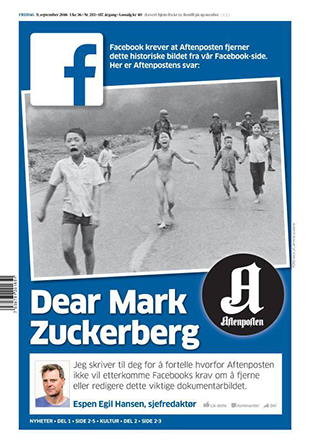 A month earlier, in a serious blow to media freedom, Facebook removed an iconic photo from the Vietnam War. The photo is widespread and famous for revealing the atrocities of the war, especially on innocent people like children.
A month earlier, in a serious blow to media freedom, Facebook removed an iconic photo from the Vietnam War. The photo is widespread and famous for revealing the atrocities of the war, especially on innocent people like children.
In a statement made following the removal of the photograph, Index on Censorship said: “Facebook should be a platform for … open debate, including the viewing of images and stories that some people may find offensive, is vital for democracy. Platforms such as Facebook can play an essential role in ensuring this.”
The newspaper whose post was censored posted a front-page open letter to Mark Zuckerberg stating that the CEO was abusing his power. After public outrage and the open letter, Facebook released a statement claiming they are “always looking to improve our policies to make sure they both promote free expression and keep our community safe”.
Facebook’s community standards claim they remove photos of sexual assault against minors but don’t mention historical photos or those which do not contain sexual assault.
The young woman shown in the photo, who now lives in Canada, released her own statement saying: “I’m saddened by those who would focus on the nudity in the historic picture rather than the powerful message it conveys. I fully support the documentary image taken by Nick Ut as a moment of truth that capture the horror of war and its effects on innocent victims.”[/vc_column_text][/vc_column][/vc_row][vc_row][vc_column][vc_basic_grid post_type=”post” max_items=”4″ element_width=”6″ grid_id=”vc_gid:1509981254255-452e74e2-3762-2″ taxonomies=”1721″][/vc_column][/vc_row]
25 Oct 2017 | Media Freedom, media freedom featured, News
[vc_row][vc_column][vc_single_image image=”96199″ img_size=”full” alignment=”center”][vc_column_text]
In 1976 All The President’s Men was released, barely two years after investigative journalism had claimed the biggest scalp on the planet, Richard Nixon’s. The film won four Academy Awards, and the American public awarded a gong to the news media: the highest trust rating journalists would ever enjoy. Seventy two per cent of people told Gallup they trusted the media a great deal or a fair amount. The corresponding figure is now 32%.
That, in a nutshell, is how the case is framed. A noble profession won the trust of the public on a hard road through Vietnam, Watergate and Thalidomide – and blew it by taking short cuts through self-regard, sloppiness and other people’s voicemails.
Does the case stack up? Some of it may, but here’s the rub. It rests on the belief that trust is a reliable guide to good journalism, and there’s precious little evidence that’s the case. The relationship between the trustworthiness of the media and the trust people invest in it is a very uncertain one.
At times in the past, the British public have trusted almost recklessly. Before the Second World War, when the BBC connived with the government to keep Winston Churchill and his anti-appeasement views off air, trust in the BBC was stratospherically high, the trustworthiness of the BBC somewhat lower. The dramatic collapse in trust, post-2000, had a lot to do with globalisation and wage stagnation and very little to do with new insights into media behaviour. Those came later.
Now the public hoards trust, and hands out little parcels to friends and “trusted sources” rather than the mainstream media. I worked at the BBC for 25 years and I saw its journalism become more trustworthy in most important respects: more accurate, more accountable, more open. Its reward? Higher trust ratings than any other news organisation in this country, but still a decline.
In this hostile terrain there are new and troubling factors, not least the arrival on the scene of media outfits, often aligned with populist political causes, which see trust as a zero-sum game. Part of their purpose, and part of the populist playbook, is to bleed trust from the institutions that came before. Often, what people worry about in that polarised environment is the erosion of a common baseline of facts. How do we have a democratic debate when we can’t even agree what facts we’re debating? But the worries shouldn’t obscure a genuine problem: what came before, politically and journalistically, was too narrow. The consensus excluded too many people.
To any part of the media that cares about being trusted, I’d say this: forget about a 72% trust rating, you’ll never see it again because the world has changed too much. In fact, forget about trust. The only thing you can control is trustworthiness; focus on that. Focus on integrity, accuracy, transparency, diversity, breadth. Trust will come and go, trustworthiness is forever.[/vc_column_text][/vc_column][/vc_row][vc_row][vc_column][vc_custom_heading text=”Battle of Ideas 2017″ use_theme_fonts=”yes” link=”url:https%3A%2F%2Fwww.battleofideas.org.uk%2F|||”][vc_separator color=”black”][vc_column_text]A weekend of thought-provoking public debate taking place on 28 and 29 October at the Barbican Centre. Join the main debates or satellite events.[/vc_column_text][vc_row_inner][vc_column_inner width=”1/3″][vc_column_text]Political activism and protest today
Recent years have seen something of a revitalisation of political protests and marches, but just what is protest historically and today?
[/vc_column_text][/vc_column_inner][vc_column_inner width=”1/3″][vc_column_text]Do YOU trust the news media?
How can we know whether journalism, particularly reporting on complex issues or assessing notoriously difficult ideas such as risk, is accurate?[/vc_column_text][/vc_column_inner][vc_column_inner width=”1/3″][vc_column_text]Censorship and identity: Free speech for you but not for me?
Is identity politics the new tool of censorship and, if so, how should we respond?[/vc_column_text][/vc_column_inner][/vc_row_inner][/vc_column][/vc_row]




![]() SUBSCRIBE NOW[/vc_column_text][/vc_column][/vc_row]
SUBSCRIBE NOW[/vc_column_text][/vc_column][/vc_row]


 A month earlier, in a serious blow to media freedom, Facebook
A month earlier, in a serious blow to media freedom, Facebook